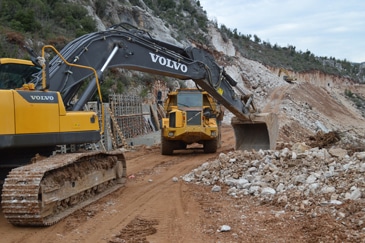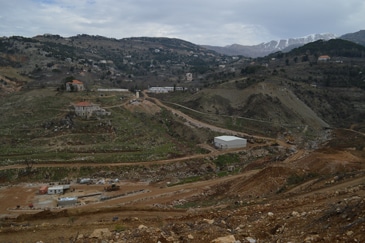A fleet of Volvo machines are being used to build the Boqaata dam in Lebanon, which will hold seven million cubic meters of water.

Mount Sannine is a famous mountain in the province of Mount Lebanon, which lies on a base of limestone and is the source of many mountain springs. Its highest point is 2,628 m (8,622 feet) above sea level – and snow is almost always visible on the mountain peak. Despite its natural beauty, Lebanon is prone to severe droughts and has depleting water sources, so the region is trying to implement immediate management plans to conserve water.
A joint venture between ROCAD Construction Limited & Khoury Contracting will see the construction of the Boqaata dam. Located 1,000m above sea level it will hold seven million cubic meters of water for the local community, capturing the one meter of rainfall that falls every year. The dam wall will contain 180,000m3 of roller compacted concrete and 50,000m3 of conventionally vibrated concrete and, once completed, will span 210m at its crest. A three kilometer service road for the dam will also be built and one million cubic meters of material will be excavated.
Construction began in April last year and the mountainous conditions have been challenging during the winter. The ground freezes hard, causing tough terrain and making it difficult to dig and excavate. The mountainous area can also become extremely foggy reducing visibility. In order for the project to take place a test was conducted, which showed that the ground – consisting of rock and gravel – has an extremely high strength and density level, allowing the build to go ahead.
The Ministry of Energy and Water in Lebanon contracted both ROCAD Construction & Khoury Contracting in a joint venture to carry out the work for the $70 million project. ROCAD Construction is based in Nigeria – a subsidiary of the R&R Group. The company was founded in 2002 and is known for constructing infrastructure primarily roads and bridges. Khoury contracting was established in 1989 and specializes in marine and municipal work, as well as heavy civil engineering.
Staying afloat
In total, there are 120 employees working at the site and the project is due for completion in 2016. “The Mount Lebanon Province faces constant water shortages that affect a population of 400,000 people,” says Bassam Egailat, project manager. “The Boqaata dam is definitely needed in the area, helping to increase tourism, economic development and growth in the Matn area.”
To build the 71m high dam and remove the overburden soil from the mountain, the consortium is using a fleet of 15 Volvo Construction Equipment (Volvo CE) machines, including five A30C-Series articulated haulers, six excavators – two EC380D-Series, two EC360B-Series and two EC290BLCs – a L120C-Series and L180D-Series wheel loader and one SD110 soil compacter. The machines are working 12 hours a day, six days a week.
“The machines are fuel efficient, with fast cycle times and low down time,” says Andre Abou Jawde, machinery superintendent. “We are happy with the after service provided by Volvo’s dealership, which is present even in the remote areas to help with logistics. Its spare parts department holds around 30,000 parts in order to meet the client’s demands as quickly as possible. Our five A30C-Series articulated haulers have proved exceptional maneuverability over muddy terrains, where soil can become like sludge in the winter. We cannot use conventional trucks to haul but the Volvos are capable of driving in any off-road conditions. They are fast and have short hauling cycle times.”

Nothing ventured nothing gained
Volvo has worked with the joint venture consortium for two years – but has also worked with one of its subcontractors, Abdallah Contracting, since 2002.
“We are very pleased with the Volvo D-series because of more efficiency with the new I-ECU display compared to the B-series,” says Abou Jawde. “The D-series also offers more power and functions. The camera fitted on the back improves safety and the machines have better digging and lifting capacities, higher productivity, more tract live force and improved hydraulics – while keeping optimal fuel consumption using ECO mode.”
“The operators are happy that the I-ECU display reminds them of upcoming services and that the machines are reliable even in tough conditions,” adds Abou Jawde. “We have other brands of machinery on site but the Volvos are the fastest and have hardly any down time. They help us stay on target so we don’t fall behind. The cost of fuel is very high so fuel efficiency is crucial for profits and productivity. The bucket heap is high and the T.P. Linkage design of Volvo wheel loaders offers good breakout force.”
After completion, the dam will act as one of the local area’s largest water source and contribute towards the growing demand of water reserves needed in the region.
Source: Volvo CE
Latest Events News
- Executive Hire Show 2026 delivers business, innovation and record engagement at CBS Arena
- Steve Vick International to make Executive Hire Show debut with Renset power station
- Innovation Trail highlights the kit shaping hire’s next chapter
- Registration Now Open for 2026 National Heavy Equipment Show
- Build Your House Saudi & Inspire for Home KSA Launch in Riyadh — Bringing Qatar’s Premier Home & Lifestyle Exhibitions to the Kingdom
 Constructionshows
Constructionshows